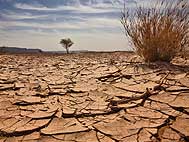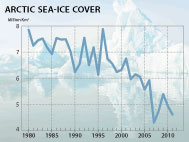| SEARCH |
-

Nov 17, 2015
Reflections on a three-decade legacy
The International Geosphere-Biosphere Programme (IGBP) will come to a close at t...
-
Nov 17, 2015
Use of and access to content on this website
Text and images produced by IGBP in house are free to use with appropriate credi...
-
Nov 12, 2015
Bella Gaia performance and panel discussion to mark IGBP's closure
A musical performance by Bella Gaia will celebrate the achievements and legacy o...
-

Towards Future Earth:
evolution or revolution?
During its three decades of existence, the International Geosphere-Biosphere Pro...
-
A personal note on IGBP and the social sciences
Humans are an integral component of the Earth system as conceptualised by IGBP. João Morais recalls key milestones in IGBP’s engagement with the social sciences and offers some words of advice for Future Earth.
-
IGBP and Earth observation:
a co-evolution
The iconic images of Earth beamed back by the earliest spacecraft helped to galvanise interest in our planet’s environment. The subsequent evolution and development of satellites for Earth observation has been intricately linked with that of IGBP and other global-change research programmes, write Jack Kaye and Cat Downy .
-
Deltas at risk
Around 500 million people worldwide live on deltas, but many of the world's deltas are sinking due ...
-
Climate change: the state of the science
A new data visualization released on the first day of the plenary negotiations at the UNFCCC’s clima...
-
Climate Change:
the State of the Science
Videos now online from the Stockholm public forum to mark the launch of the IPCC's climate report, 2...

Workshop: Effects of ocean acidification on ecosystems and human societies
This free workshop will assess the Swedish research capacity and prospects for national and international collaboration. It will be held from 24-25 November 2015. Please register by 20 October.
In partnership with IMBER (Integrated Marine Biogeochemistry and Ecosystems Research), the Swedish National Committee for Global Environmental Change and the Environmental Committee at the Royal Swedish Academy of Sciences, the Swedish Secretariat for Environmental Earth System Sciences (SSEESS) organises a workshop to:
- Investigate the knowledge base, gaps and Swedish research capacity when it comes to impacts of ocean acidification in relation to ecosystems (considering multiple threats) and socioeconomics (including fisheries), as well as management of these impacts.
- Increase the collaboration among researchers in Sweden within ocean acidification related research (e.g. through an active network and/or a Swedish research programme), with linkages to IMBER.
- Inform about IMBER´s Science Plan and activities, and stimulate involvement of Sweden-based researchers in IMBER.
The workshop takes place at the Royal Swedish Academy of Sciences in Stockholm from 24-25 November 2015. (Starting with lunch at 12:00 on the 24th).
WHO IS IT FOR?
The workshop is open for researchers affiliated with Swedish institutions/universities who are active or interested in biogeochemical and/or socioeconomic research related to ocean acidification.
Key representatives of IMBER and Swedish funding agencies will also participate.
REGISTRATION
The workshop will be free of charge, but the number of participants is limited and registration is required.
Please send an email to SSEESS Senior Research Officer Dan Wilhelmsson for registration, including if you wish to take part in the workshop dinner on 24 November (please indicate any special dietary requirements too).
Last day for registration is 20 October 2015
FURTHER INFORMATION AND CONTACTS
The detailed programme is currently in development and will be circulated mid- September, along with some additional information on the SSEESS website.
For any other questions, including opportunities for travel support, please contact SSEESS Senior Research Officer Dan Wilhelmsson.
PROGRAMME OVERVIEW
The 1.5 - day workshop will include:
— Introduction to IMBER research (past, present and planned), the organisation of IMBER, and a briefing on the global research initiative Future Earth
— Discussions, presentations and mapping of the Swedish knowledge base, research gaps and Swedish research capacity when it comes to impacts of ocean acidification in relation to
· ecosystems (considering multiple threats) and socioeconomics (including fisheries)
· management of the abovementioned impacts
— Presentations of funding agencies and their current priorities
— Exploration of opportunities for programmatic collaboration/networking among researchers in Sweden and engagement in IMBER
— A workshop dinner will be held in the evening of the 24 November 2015

IGBP closed at the end of 2015. This website is no longer updated.
-

Global Change Magazine No. 84
This final issue of the magazine takes stock of IGBP’s scientific and institutional accomplishments as well as its contributions to policy and capacity building. It features interviews of several past...
-

Global Change Magazine No. 83
This issue features a special section on carbon. You can read about peak greenhouse-gas emissions in China, the mitigation of black carbon emissions and the effect of the 2010-2011 La Niña event on gl...
-
INTERGOVERNMENTAL PANEL ON CLIMATE CHANGE:
How green is my future?
UN panel foresees big growth in renewable energy, but policies will dictate just how big.
-
UK:
'The Anthropocene: a new epoch of geological time?'
Royal Society, Philosphical Transactions A




















